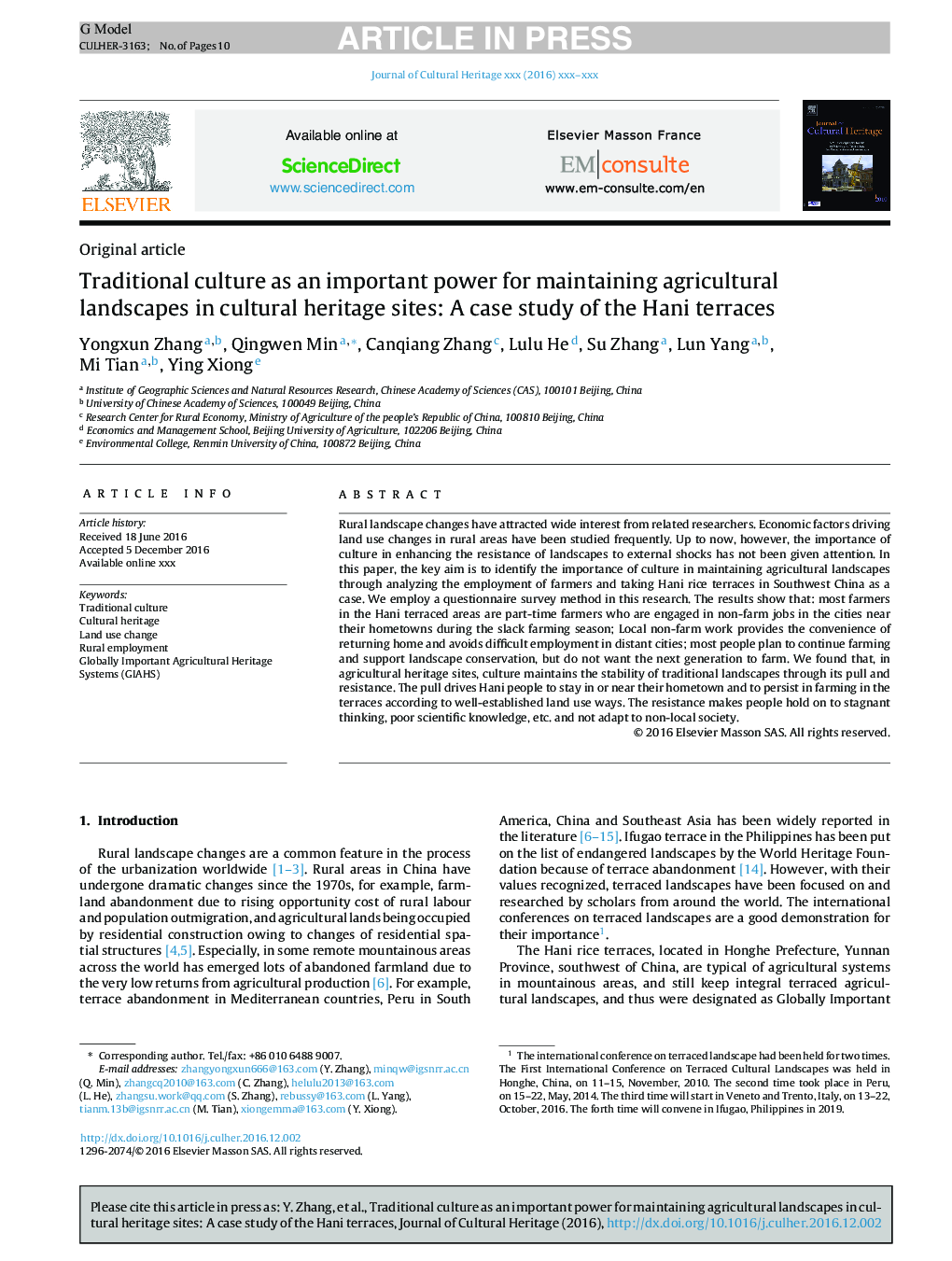| کد مقاله | کد نشریه | سال انتشار | مقاله انگلیسی | نسخه تمام متن |
|---|---|---|---|---|
| 5112656 | 1483951 | 2017 | 10 صفحه PDF | دانلود رایگان |
عنوان انگلیسی مقاله ISI
Traditional culture as an important power for maintaining agricultural landscapes in cultural heritage sites: A case study of the Hani terraces
ترجمه فارسی عنوان
فرهنگ سنتی به عنوان یک قدرت مهم برای حفظ مناظر کشاورزی در میراث فرهنگی: مطالعه موردی تراسهای هانی
دانلود مقاله + سفارش ترجمه
دانلود مقاله ISI انگلیسی
رایگان برای ایرانیان
کلمات کلیدی
ترجمه چکیده
تغییرات چشم انداز روستایی از محققان مرتبط جلب توجه فراوانی کرده است. عوامل اقتصادی موثر بر تغییر کاربری زمین در مناطق روستایی اغلب مورد مطالعه قرار گرفته است. با این حال، تا به حال، اهمیت فرهنگ در افزایش مقاومت در برابر مناظر به شوک های خارجی توجه نشده است. در این مقاله، هدف اصلی شناسایی اهمیت فرهنگ در حفظ مناظر کشاورزی با استفاده از تجزیه و تحلیل اشتغال کشاورزان و استفاده از تراس برنج هانی در جنوب غربی چین به عنوان یک مورد است. روش تحقیق پرسشنامه در این تحقیق است. نتایج نشان می دهد که: بیشتر کشاورزان در حوزه های حیاطی هانی، کشاورزان نیمه وقت هستند که در مناطق غیر کشاورزی در شهرهای نزدیک شهرک هایشان در طول فصل خشکسالی فعالیت می کنند؛ کار غیر کشاورزی محلی راحتی بازگشت به خانه را فراهم می کند و از کارهای دشوار در شهرهای دور دست جلوگیری می کند؛ اکثر مردم برنامه ریزی برای ادامه کشاورزی و حمایت از حفاظت از چشم انداز، اما نمی خواهند نسل بعدی به مزرعه. ما دریافتیم که در فرهنگ های میراث فرهنگی، فرهنگ با پایداری و مقاومت خود، پایداری چشم انداز های سنتی را حفظ می کند. مردم هنی به دنبال کشاندن مردم به محل اقامتشان در نزدیکی شهرشان هستند و در تراس ها با توجه به روش های درست استفاده از زمین، به کشاورزی ادامه می دهند. این مقاومت باعث می شود مردم به تفکر رادیکال، دانش علمی ضعیف و غیره دست یابند و به جامعه غیر محلی نپیوندند.
موضوعات مرتبط
مهندسی و علوم پایه
شیمی
شیمی تئوریک و عملی
چکیده انگلیسی
Rural landscape changes have attracted wide interest from related researchers. Economic factors driving land use changes in rural areas have been studied frequently. Up to now, however, the importance of culture in enhancing the resistance of landscapes to external shocks has not been given attention. In this paper, the key aim is to identify the importance of culture in maintaining agricultural landscapes through analyzing the employment of farmers and taking Hani rice terraces in Southwest China as a case. We employ a questionnaire survey method in this research. The results show that: most farmers in the Hani terraced areas are part-time farmers who are engaged in non-farm jobs in the cities near their hometowns during the slack farming season; Local non-farm work provides the convenience of returning home and avoids difficult employment in distant cities; most people plan to continue farming and support landscape conservation, but do not want the next generation to farm. We found that, in agricultural heritage sites, culture maintains the stability of traditional landscapes through its pull and resistance. The pull drives Hani people to stay in or near their hometown and to persist in farming in the terraces according to well-established land use ways. The resistance makes people hold on to stagnant thinking, poor scientific knowledge, etc. and not adapt to non-local society.
ناشر
Database: Elsevier - ScienceDirect (ساینس دایرکت)
Journal: Journal of Cultural Heritage - Volume 25, MayâJune 2017, Pages 170-179
Journal: Journal of Cultural Heritage - Volume 25, MayâJune 2017, Pages 170-179
نویسندگان
Yongxun Zhang, Qingwen Min, Canqiang Zhang, Lulu He, Su Zhang, Lun Yang, Mi Tian, Ying Xiong,
